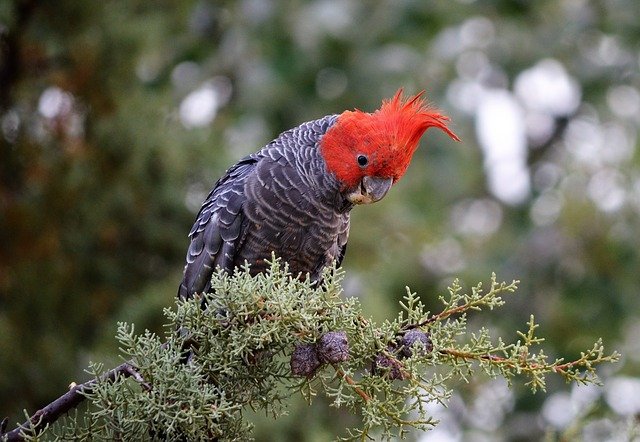
Planet A
New research shows that rising temperatures from climate change have caused physical changes in warm-blooded species to help them dispel heat and regulate body temperature.
These changes indicate generations of persistent overheating, and are highly pronounced in Australian birdlife, including the gang-gang cockatoo and the red-rumped parrot, whose beaks have increased in size by up to 10% since the late 1800s. Climate change-linked events like the 2019–20 bushfires caused significant habitat and population loss, driving the gang-gang cockatoo towards endangered status. And climate change is accelerating ecological changes faster than most species can adapt.
Australia has been a major contributor to global biodiversity loss, and national biodiversity is still declining. The outlook is poor for Australia’s ecological reproduction, food security and agriculture. Attempts to limit biodiversity loss, such as zero extinction targets, will fail if more significant steps aren’t taken to limit global warming to 1.5°C.
Democracy watch
Protests continue in Brazil after beleaguered far-right President Jair Bolsonaro called supporters to rally on 7 September in a ‘do or die’ event that many worried could parallel the 6 January US Capitol attack. Bolsonaro faces possibly the most fraught moment of his presidency as anger over his vaccine corruption, mishandling of Covid-19 and attempts to change the electoral rules for next year’s election reaches boiling point.
Speaking to the rally of 100,000 supporters, Bolsonaro attacked the judiciary, saying that he would no longer comply with decisions of the Supreme Court and that ‘only God removes me’. The defence ministry reportedly told congressional leaders that the 2022 elections won’t take place unless Bolsonaro’s demands for changes to the country’s electronic voting system to include a paper trail are met.
Brazil’s democratic institutions may not weather these scathing attacks on their legitimacy as, despite over 580,000 Brazilian deaths from Covid, Bolsonaro retains the support of his country’s elites in the form of the centrão, which has been described in the media as ‘a powerful bloc of self-serving, ideology-lite, centre-right parties’.
Information operations
Buzzfeed News says facial recognition software produced by the technology company Clearview AI was used by law enforcement and other government agencies in 25 countries, including Australia, between 2018 and February 2020. The controversial technology allows users to upload an image of a person which is run through artificial-intelligence software that’s been trained using billions of social media and other online images to find potential matches.
While Clearview claims 100% accuracy, Buzzfeed says its technology can misidentify individuals and highlights concerns about both the efficacy of AI-driven facial recognition tools in policing and the need to protect citizens from profiling, wrongful investigation and arrest. Clearview AI has already been found to have breached data security laws in Canada and has been investigated by regulators in Australia and the UK, and now the European Union. An inquiry into Clearview by the Office of the Australian Information Commissioner is ongoing.
Follow the money
Russian President Vladimir Putin and his Belarussian counterpart, Alexander Lukashenko, agreed on Thursday to substantial further economic integration as Belarus finds itself increasingly isolated in the aftermath of last year’s fraudulent elections and the forced landing of a Ryanair flight in May.
Within the framework of the Union State, a post-Soviet attempt to reunite Belarus and Russia, Moscow will continue to supply Minsk with significantly discounted natural gas with an eye to the eventual integration of their energy markets. Moscow has also agreed to grant Belarus a further US$1.5 billion in loans on top of US$106 billion pumped into its economy between 2005 and 2015. Belarus’s brutal crackdown on opposition protests and consequent US and EU sanctions have further increased the country’s reliance on its larger neighbour.
This confronts the countries imposing sanctions with the possibility that half measures will render Belarus effectively an extension of Russian territory. Belarusian opposition leader Sviatlana Tsikhanouskaya has called for ‘harsher sanctions’ to break the back of the Lukashenko regime.
Terror byte
The 20th anniversary of the 9/11 terrorist attacks on the US and the reinstatement of Taliban rule in Afghanistan have sparked reflection on the future of jihadist extremism, with some analysts suggesting that Africa will be the next epicentre of Islamic insurgency. In Somalia, the Sahel and to the north of Lake Chad, jihadist groups are thriving by exploiting local instability, poor governance structures and weak state armed forces. Although no African country faces collapse due to extremism as happened in Afghanistan, the withdrawal of foreign troops from Mali and Somalia has rung alarm bells.
The CIA has increased its counterterrorism efforts through the US Africa Command. Drone flights now monitor insurgent groups and a training and logistics base in the Sahara. It’s uncertain, though, whether heightened military intervention alone will be enough to quell extremism on the continent. Disenchantment among young people, failing economies and governments’ poor delivery of basic services are key recruitment drivers for extremist groups. Along with Afghanistan, foreign militaries have struggled to address these issues in Iraq, Yemen and Syria.

